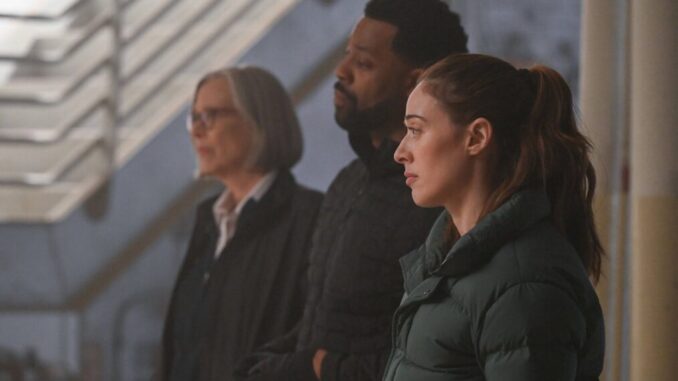
The familiar growl of the El train, a sound often as comforting as it is grating in Chicago, feels different as Season 13 opens. It’s not just the city’s pulse; it’s a tremor, a warning. For Sergeant Hank Voight and his Intelligence unit, the ground beneath their feet has given way, violently, in the wake of what’s now grimly referred to as “md07”—a collapse whose reverberations have shattered the very foundations of District 21, and perhaps, the trust in policing itself.
Voight, the grizzled patriarch whose moral compass has always spun in shades of gray, now presides over a shell of his once-tight team. The long shadows of his office, once a sanctuary for ethically dubious but effective decisions, now seem to stretch into his very soul, deepening the lines of fatigue around his eyes. The camaraderie that once permeated the bullpen—the quick jokes, the unspoken understanding, the unwavering loyalty forged in the crucible of urban crime—has been replaced by a brittle silence, punctuated only by the clack of keyboards and the creak of worn chairs. Each member carries the weight of “md07” differently, but its indelible mark is visible in their averted gazes, their clenched jaws, and the almost imperceptible hesitation before they move as one.
The collapse, whatever its exact nature—a devastating operational failure, a catastrophic ethical breach that exposed the unit’s often-unconventional methods, or perhaps a perfect storm of both—has driven a wedge deep into the heart of Intelligence. Hailey Upton, once Voight’s fiercely loyal, if increasingly conflicted, protégé, moves with a newfound weariness, her sharp gaze now often distant, lost in a landscape of self-doubt. The implicit trust she once placed in Voight’s instinct has eroded, replaced by a haunting skepticism. Her movements are precise, almost robotic, a stark contrast to the fluid aggression she once embodied. She still shows up, still performs, but the fire is banked, replaced by a simmering anger that could turn inward or outward at any moment.
Kevin Atwater, the team’s moral anchor, finds his own compass spinning wildly off course. He’s always wrestled with the compromises inherent in Voight’s justice, but “md07” seems to have pushed him to a precipice. The city he swore to protect now looks at him with open hostility, and the badge he wears feels heavy, tarnished by association. His efforts to bridge the gaps, to find common ground, are met with weary resignation from his teammates. He’s trying to hold onto his idealism in a world that seems determined to crush it, making him feel more isolated than ever within the very unit he considers family.
Adam Ruzek and Kim Burgess, survivors of their own personal and professional storms, now navigate a relationship strained by the professional wreckage. They find solace in each other, but the collective trauma of “md07” casts a long shadow over their fragile peace. Ruzek, ever the optimist trying to hold things together with sheer force of will, sees his efforts often fall flat, the usual banter replaced by strained politeness. Burgess, pragmatic and fiercely protective of her daughter, seems to have retreated further into herself, her focus narrowed to survival, wary of any misstep that could jeopardize her tenuous stability. The easy rapport, the shared understanding of a partner in a tight spot, is gone, replaced by a hyper-awareness of personal boundaries and unspoken grievances.
Voight, ever the solitary wolf, finds his methods under unprecedented scrutiny, both internally and externally. The public outcry from “md07” has brought down the full weight of internal affairs, the district commander, and an unforgiving media. His usual back-channels are compromised, his authority questioned at every turn. He attempts to re-assert control, to gather his flock, but his rallying cries lack their usual conviction, falling on ears deafened by disillusionment. He’s trying to rebuild a house with shattered timbers, his own moral ambiguities now glaringly exposed as potential weaknesses rather than strengths. The whiskey bottle in his desk drawer has seen more action than his team’s united front.
Season 13 opens not with a bang, but with a weary sigh. The first briefing is a tableau of professional isolation: eyes on the table, shoulders hunched, responses clipped and devoid of the usual collaborative energy. Voight outlines the latest case—a brutal murder that demands their attention—but the subtext is louder than his words: Can we still do this? Can we still trust each other to have our backs when the world has turned its back on us? The city itself, often a character in its own right, feels colder, more hostile, its streets now a minefield of potential pitfalls for a unit operating without its usual cohesion.
As the team steps out into the gritty Chicago morning, the question hangs heavy in the air: can Voight, the ultimate survivor, reforge a team from these fractured pieces, or will the weight of “md07” finally prove to be the collapse from which Intelligence, and its weathered leader, can never fully recover? The season promises to be a stark, unflinching look at the cost of justice, the erosion of trust, and the painful, uncertain path toward redemption—or ultimate dissolution.
